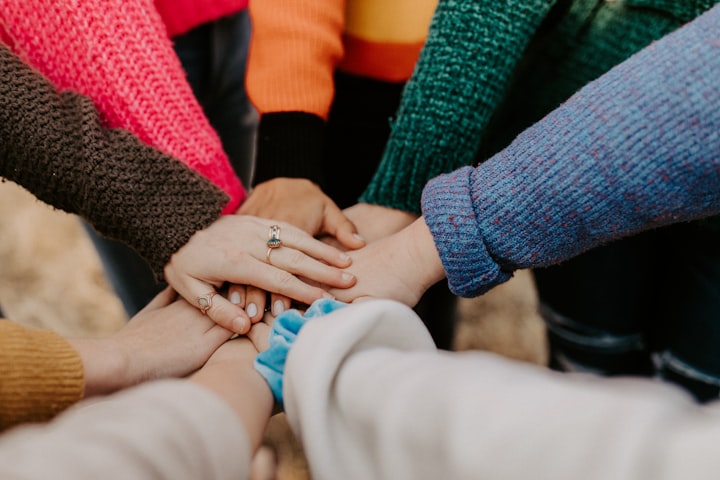Be a Better Ally: Tips for Supporting the LGBTQ+ Community
Tips for Supporting the LGBTQ+ Community

Be a Better Ally: Tips for Supporting the LGBTQ+ Community
Welcome to our guide on how to be a better ally to the LGBTQ+ community. Being an ally means supporting and advocating for the rights of those in the community, and standing up against discrimination and prejudice. In this section, we will discuss the importance of allyship and its role in fighting for equality. We will also provide tips for being a better ally and supporting the LGBTQ+ community. Let's get started!
Educate Yourself on LGBTQ+ Issues
Being an ally to the LGBTQ+ community requires education and understanding of the issues faced by the community. Educating yourself on LGBTQ+ topics such as gender identity, sexual orientation, and the obstacles faced by the community is crucial to providing support and advocacy. Here are some tips on how to educate yourself on these important issues:
1. Read Books and Articles
Reading books and articles written by LGBTQ+ individuals and experts in the field is a great way to learn about the experiences, challenges, and triumphs of the community. Some recommended books include "Transgender History" by Susan Stryker and "The Gay Revolution" by Lillian Faderman. Online resources such as GLAAD and The Advocate also provide a wealth of information on LGBTQ+ topics.
2. Watch Films and Documentaries
Films and documentaries are powerful tools for gaining insight into the lives of LGBTQ+ individuals. Watching movies and documentaries such as "Paris is Burning" and "The Death and Life of Marsha P. Johnson" can provide a deeper understanding of the LGBTQ+ community and its history.
3. Attend Workshops and Events
Attending workshops and events focused on LGBTQ+ issues can provide opportunities for dialogue and engagement with the community. Events such as Pride parades and LGBTQ+ film festivals can also increase awareness and visibility of the community.
Educating oneself on LGBTQ+ issues is an ongoing process that requires active engagement and an open mind. By taking the time to learn about these important topics, allies can better support and advocate for the LGBTQ+ community.
Support LGBTQ+ Organizations and Causes
As an ally, it's important to not only educate oneself on LGBTQ+ issues but also actively support the community. There are various LGBTQ+ organizations and causes that work towards equality and fight against discrimination. Here are some ways to get involved:
Volunteer: Many LGBTQ+ organizations rely on volunteers to carry out their mission. Reach out to local organizations and see how you can assist with events, fundraising, or other projects.
Donate: Donating to LGBTQ+ organizations is another way to support the community. Research reputable organizations and make a contribution to help them continue their important work.
Attend Events: Participate in events hosted by LGBTQ+ organizations, such as Pride parades or rallies. This not only shows support but also helps to raise awareness about the community's struggles and achievements.
Advocate: Speak out against discrimination and support policies that promote equality for LGBTQ+ individuals. Contact elected officials and urge them to take action on LGBTQ+ issues.
"Allyship should go beyond financial support and engage in activism. Use your voice and privilege to fight for the rights and equality of LGBTQ+ individuals."
Remember, allyship goes beyond financial support and attending events. It's about actively fighting for the rights and equality of LGBTQ+ individuals. Use your voice and privilege to make a difference.
Be Mindful of Language and Behavior
Being an ally to the LGBTQ+ community involves not only supporting the community, but also being mindful of language and behavior when interacting with individuals. Below are some tips for being mindful:
Use inclusive language: Use gender-neutral language and avoid making assumptions about someone's sexual orientation or gender identity. For example, use "partner" instead of "husband" or "wife."
Avoid stereotypes: Avoid using stereotypes and generalizations about the LGBTQ+ community. Everyone's experiences are unique and should not be reduced to stereotypes.
Respect pronouns: Use the correct pronouns for individuals. Some people may use pronouns such as "they/them" or "ze/hir." If you are unsure what pronouns someone uses, it is okay to politely ask.
"Language is important because it reflects and influences culture, society, and individuals. As an ally, it is important to use language that is inclusive and respectful towards the LGBTQ+ community."
While being mindful of language and behavior is important, it is essential to recognize that being an ally goes beyond just avoiding offensive language and behaviors. It involves actively standing up against discrimination and advocating for change.
Take Action Against Discrimination
Being an ally to the LGBTQ+ community involves actively standing up against discrimination. Here are some ways you can take action:
Speak up: If you witness discrimination towards an LGBTQ+ individual, speak up and offer support. Let them know that they are not alone and that their experiences are valid.
Report discrimination: If you witness discrimination in a workplace or public setting, report it to the appropriate authority. This could be human resources, management, or law enforcement.
Advocate for change: Advocate for change on a larger scale by supporting LGBTQ+ organizations and causes. Attend rallies, sign petitions, and contact your elected officials to let them know that you support LGBTQ+ rights.
Use your privilege: If you belong to a privileged group, such as being heterosexual or cisgender, use your privilege to amplify the voices of marginalized communities. Use your platform to educate others and support LGBTQ+ individuals.
Continue learning: Continue to educate yourself on LGBTQ+ issues and challenges faced by the community. This will help you better understand how to take action and support the community.
Remember, being an ally is an ongoing process. It involves continuous learning, self-reflection, and action. Take the first step and commit to being an ally to the LGBTQ+ community.
FAQ
As an LGBTQ+ ally, it's natural to have questions about how to best support the community. Here are some frequently asked questions to help guide your allyship:
What does it mean to be an LGBTQ+ ally?
Being an LGBTQ+ ally means actively supporting and advocating for the rights and equality of the LGBTQ+ community. This involves educating oneself on LGBTQ+ issues, using inclusive language and behavior, standing up against discrimination, and supporting LGBTQ+ organizations and causes.
How can I support my LGBTQ+ friends and family members?
First and foremost, listen to their experiences and validate their feelings. Offer your support and let them know that they can come to you for help. Educate yourself on LGBTQ+ issues and provide resources for them to do the same. Stand up against discrimination and use inclusive language when speaking with them.
How can I educate others about LGBTQ+ issues?
One of the most effective ways to educate others is to lead by example. Use inclusive language and behaviors in your own life, and have conversations with others about why it's important to do so. Share resources and information on LGBTQ+ issues, and be willing to listen and answer questions with empathy and understanding.
What should I do if someone is being discriminatory towards LGBTQ+ individuals?
Call them out on their behavior in a calm and respectful manner. Explain why their language or behavior is hurtful and offer alternative ways to approach the situation. If the behavior persists, consider reporting it to a higher authority or seeking support from LGBTQ+ organizations or allies.
How can I use my privilege to support marginalized communities?
As an ally, it's important to acknowledge and use your privilege to amplify marginalized voices and create space for their experiences. This can involve speaking out against discrimination, supporting diverse representation in media and politics, and using your resources and platform to uplift and advocate for marginalized communities.
About the Creator
mh Solutions
Content creator & blog writer. Write engaging, informative content that helps businesses succeed. Contact me for freelance or full-time work.
Reader insights
Outstanding
Excellent work. Looking forward to reading more!
Top insights
Compelling and original writing
Creative use of language & vocab
Easy to read and follow
Well-structured & engaging content
Excellent storytelling
Original narrative & well developed characters
Expert insights and opinions
Arguments were carefully researched and presented
Eye opening
Niche topic & fresh perspectives
Heartfelt and relatable
The story invoked strong personal emotions
Masterful proofreading
Zero grammar & spelling mistakes
On-point and relevant
Writing reflected the title & theme





Comments (1)
GREAT WORK, I JUST LOVE IT